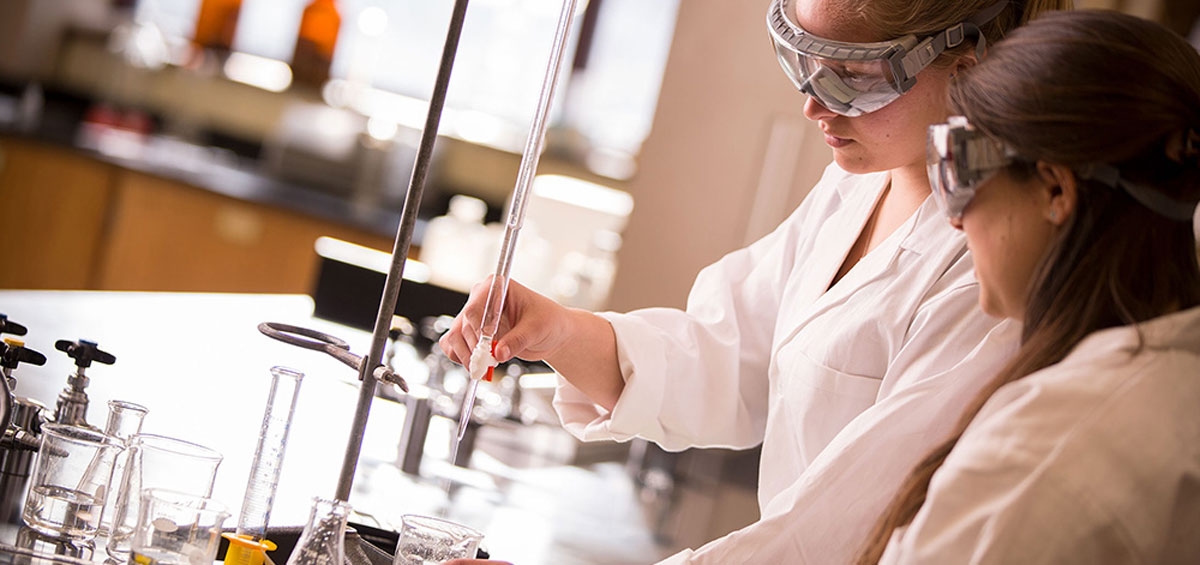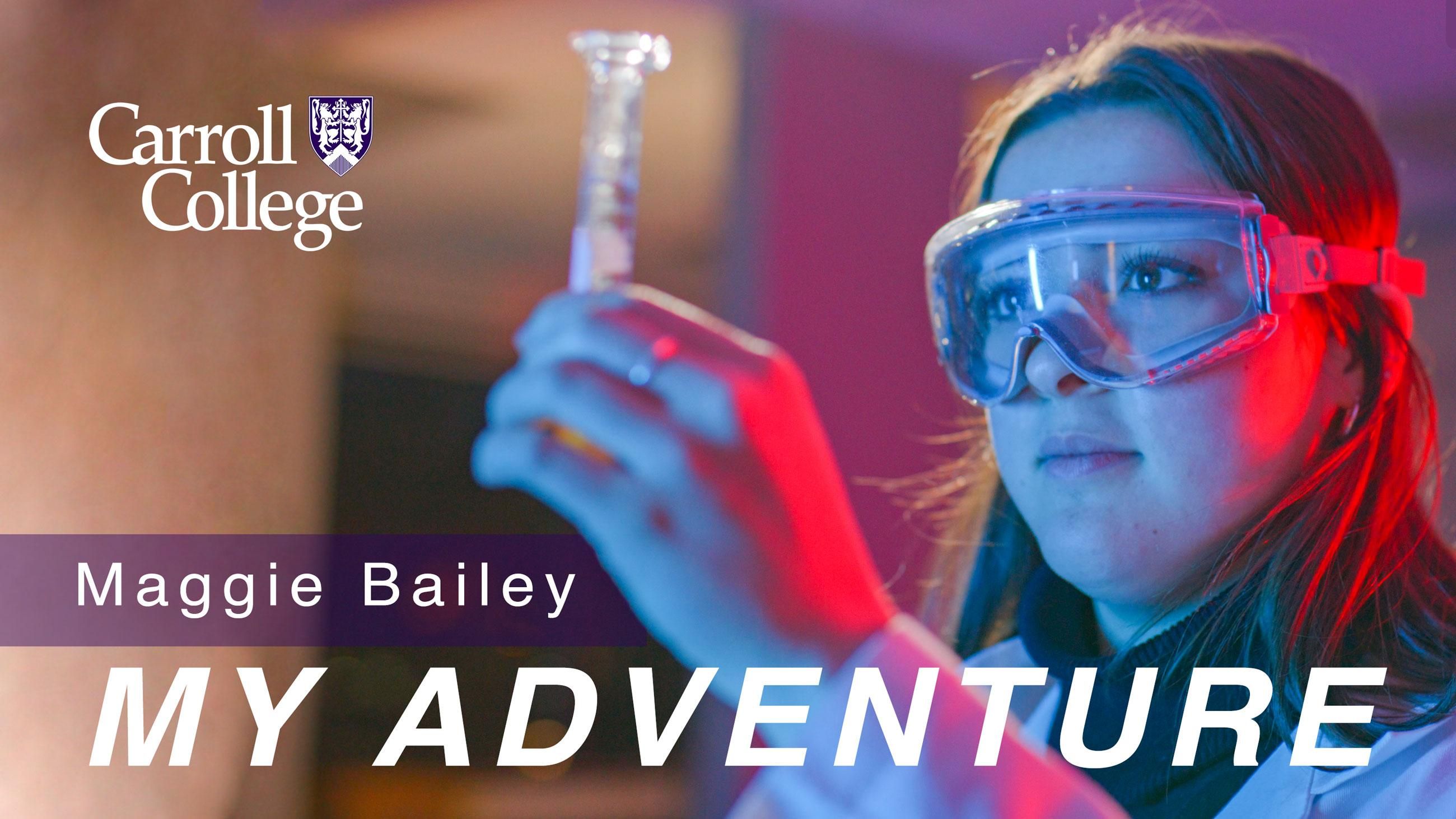Biochemistry and molecular biology majors are always asking the same questions: How does life work at the most molecular level? What are the most fundamental roots of health and disease? How do medications work when they treat and sometimes cure disease? How are genes controlled as they determine our traits? By combining these disciplines, our students approach the answers from a unique perspective.

Biochemistry-Molecular Biology
Details
Biochemistry and molecular biology are two of the most actively growing areas of science. At Carroll College, we don’t see these disciplines as separate. Colleges with good biochemistry programs create highly integrated curriculums that teach both together, to answer questions holistically.
- Undergraduate
- Major

About the Program
If you’re looking to receive your biochemistry degree or molecular biology degree at Carroll, we have designed an innovative program that exposes students to biochemistry and molecular biology in a highly interdisciplinary way. Here, as a molecular biology–biochemistry major you are provided with opportunities to study the most fundamental aspects of life in ways that challenge you to develop strong deductive, analytical, and quantitative skills.


I was proud to represent Carroll College at such a prestigious internship program with students from larger institutions such as the University of Notre Dame, Cornell University, and Pomona College. Our paper’s review took approximately seven months after submission and it marks only the beginning of my pursuit in exploring the duality of benchtop to bedside research.
Michael Henderson Class of 2021, Biochemistry Molecular Biology
In the News
-
Carroll College Receives Research Grants from M.J. Murdock Charitable Trust
Molecular Control of Synaptic Function
Dr. Stefanie Otto-Hitt has received a two-year life sciences award in the amount of $42,088 to continue her study titled "Molecular Control of Synaptic Function."
-
More about Michael Henderson
Science Advances
The research of Michael Henderson was recently published in Science Advances, the American Association for the Advancement of Science’s (AAAS) open-access multidisciplinary journal.
-
Carroll Students Present at the Murdock Undergraduate Research Conference (448)
Murdock Science Research Conference
Six research students from Chemistry, Biology, and Biochemistry & Molecular Biology attended the 31st annual Murdock Science Research Conference in Vancouver, WA.
Why Biochemistry-Molecular Biology at Carroll?
Quality teaching
Quality teaching from highly experienced instructors makes a bachelor of science in biochemistry–molecular biology at Carroll College valuable because the curriculum allows students to experience excellent cross-disciplinary instruction in biology, chemistry, physics, and math.
Small, cohesive classrooms
At Carroll College, professors actively will work with you personally in small, cohesive classroom settings. You’ll have the opportunity to conduct cutting-edge research in the lab and in Montana’s great outdoors. The equipment used for lab courses and research as an undergraduate biochemistry–molecular biology degree is quality — and you won’t have to compete with graduate students for these unique opportunities.
Real world, hands-on projects
Students in the biochemistry–molecular biology program at Carroll study the biochemistry of neurodegenerative diseases and have the opportunity to research hands-on projects, like the West Nile virus in Montana. Working directly with your professors, both inside the classroom and in the research lab, makes an education at Carroll the best of both worlds.
Featured Courses
Browse all coursesCell and Molecular Neuroscience
This course explores the cellular and molecular biology of the nervous system. Topics covered include the cellular and anatomical organization of the nervous system, electrical signaling, synaptic transmission, neurotransmitters and receptors, and synaptic plasticity.
Physical Chemistry for Life Sciences
This course focuses on quantum mechanics, spectroscopy, thermodynamics, statistical mechanics, and kinetics as they pertain to chemical and biochemical systems.
If you want to understand life, health, and disease at a molecular level, biochemistry and molecular biology is the education for you. You will be a part of one of the most rapidly growing areas of science and experience an innovative, multidisciplinary curriculum. As a biochemistry major, you’ll also be offered lots of great opportunities post-graduation, whether it’s through an internship in the field or a ready-to-start career.
You’ll gain skills that will help you be effective. In addition to solid writing skills and good mathematics, you’ll be able to work well with others and communicate solutions in your field. The Bureau of Labor Statistics (BLS) indicates that careers in biochemistry are likely to increase, expected to grow by over 30 percent in 2020.
You have a lot of options as a molecular biology major. Students completing a Biochemistry-Molecular Biology degree will be highly prepared for the following types of careers:
- Agricultural research
- Biochemist
- Biologist
- Biomedical research
- Chemical Safety Engineer
- Chemistry Professor
- Clinical Lab Scientist
- Dentistry
- Environmental Chemist
- Graduate school in the majority of science disciplines
- Medical Scientist
- Medicine and Health Care careers
- Pharmacy school
- Plastic Surgeon
- Veterinary school
When we award a financial aid package it is not just to get you here, it is a four-year commitment to see you graduate and succeed. Every year you will have the opportunity to meet with financial aid, renew your goals, explore opportunities for on-campus work, and make sure you are on track with any borrowing. Find out more.